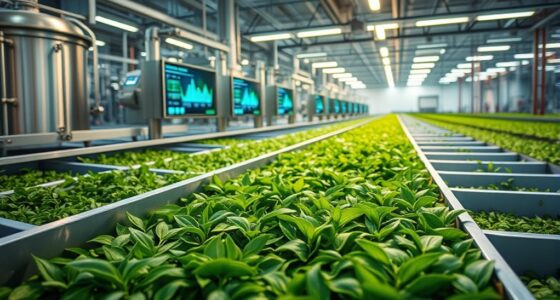Sustainability is driving the tea industry forward by responding to what you care about. Many tea drinkers want ethical products, like Fair Trade teas, and over half are willing to pay more for them. As climate change threatens production, tea companies are adopting eco-friendly practices, like organic farming, to protect crops. New technology, like blockchain, ensures your tea is sourced responsibly and helps small farmers thrive. These changes not only fight labor exploitation but also improve the quality of tea. If you're curious about how these efforts are reshaping the tea landscape, there's plenty more to discover!
Key Takeaways
- Growing consumer demand for sustainable tea encourages brands to adopt ethical sourcing and production methods, driving industry change.
- The organic tea market is expanding rapidly, with an annual growth rate of 10%, reflecting increasing consumer preference for sustainable options.
- Blockchain technology enhances transparency and traceability in tea supply chains, ensuring fair practices and reducing fraud.
- Fair Trade certifications improve wages and working conditions for tea producers, addressing labor exploitation and promoting sustainability.
- Innovative agricultural practices like agroforestry promote biodiversity while reducing chemical use, aligning with sustainability goals in tea production.
Introduction

Sustainability is becoming a vital focus in the tea industry, and it's not just a trend; it's a necessity driven by consumer demand for ethically sourced products. More than half of you're willing to pay extra for sustainable tea brands, which shows how important this issue is becoming.
As you explore options, you'll find that the global market for organic tea is growing rapidly, with an annual increase of 8.5%.
Did you know that around 60% of tea comes from smallholder farmers? Supporting these farmers through ethical sourcing is crucial. Fair Trade certifications help ensure that these farmers get fair wages and practice sustainable farming. By choosing tea with these certifications, you're also promoting better environmental practices.
The tea industry is embracing innovative agricultural practices like agroforestry, which helps protect biodiversity and ecosystems. These methods reduce chemical use and enhance the health of our planet.
Climate Impact on Tea Production

As climate change continues to reshape our world, the tea industry is facing unprecedented challenges that threaten its very foundation. In Kenya, a major tea producer, it's projected that suitable tea-growing regions could shrink by 26.2% by 2050. This change means fewer places to grow tea crops, which could lead to lower tea yields.
Erratic weather patterns, like unpredictable rainfall and severe droughts, have already decreased yields by up to 30%. Rising temperatures disrupt growing seasons, resulting in lower quality tea. Additionally, as pests thrive due to warmer conditions, farmers often turn to chemical pesticides, which harm the environment.
The tea industry, producing 6.5 million metric tons in 2021, must adapt to climate impacts to ensure its sustainability. One way forward is embracing sustainable practices like organic farming. This approach reduces reliance on harmful chemicals and helps maintain healthy ecosystems.
Consumer Demand Drives Sustainable Practices

Consumer interest in sustainably produced tea has skyrocketed, reshaping the industry landscape. Today's eco-conscious consumers are driving a strong demand for sustainable tea production. More than 70% of tea drinkers prefer brands that focus on ethical sourcing and environmental responsibility.
This shift has led to a remarkable rise in the market for organic tea, which is expected to grow by 10% each year until 2028. Fair Trade certification is becoming more popular, helping around 1 million tea producers earn fair wages and work in better conditions. As a result, you can feel good knowing that your choices support these communities.
Research shows that brands that emphasize sustainability not only attract attention but also build customer loyalty; 60% of consumers are willing to pay more for products that match their values. Major tea brands are stepping up, committing to transparency in their supply chains.
About 54% of tea companies are investing in sustainable practices to meet your expectations. By choosing sustainable tea, you're not just enjoying a delicious drink; you're also playing a part in a positive change for the planet and its people!
Blockchain in Tea Sourcing

The rise of consumer demand for sustainable practices in the tea industry has opened the door for innovative technologies like blockchain. This technology provides end-to-end traceability, letting you verify the journey of your tea from farm to cup. With blockchain, you can enjoy greater transparency in the supply chain.
By streamlining certification processes, blockchain helps producers meet standards like Fair Trade and Rainforest Alliance more easily. It also allows for real-time monitoring of environmental and social practices on tea plantations. This ensures that ethical sourcing and sustainability commitments are upheld.
Moreover, using blockchain reduces the risk of fraud, making claims about organic and fair trade certifications more credible. You can feel confident in your purchases!
Research shows that integrating blockchain can lower operational costs for smallholder farmers. By improving supply chain efficiency and cutting out unnecessary intermediaries, farmers can benefit directly.
Labor Exploitation in Tea Farms

Labor exploitation frequently emerges as a critical issue in tea farms, where many workers, predominantly women, struggle to earn wages that barely cover their basic living expenses. This situation keeps them trapped in a cycle of poverty.
Unsafe working conditions are also common, and without protective equipment, workers face health risks when handling harmful pesticides.
Additionally, child labor remains a significant problem in the tea industry. Thousands of children are employed in labor-intensive tasks on tea farms, compromising their education and well-being. The need for ethical practices is urgent.
Fair Trade certification aims to tackle labor exploitation by ensuring fair wages and safer working conditions for tea producers, but only a small percentage of global tea production meets these standards.
It's essential to support smallholder farmers, who often lack bargaining power and are vulnerable to unfair labor practices.
Practical Applications

In addressing sustainability in the tea industry, practical applications play a crucial role in transforming the landscape for producers and consumers alike. You can support sustainable tea companies by choosing brands that prioritize organic farming. These companies avoid synthetic fertilizers and pesticides, enhancing soil health and biodiversity. This not only improves tea quality but also helps the environment.
When you buy Fair Trade certified tea, you ensure that producers receive fair wages and work in safe conditions. This supports over 13 million people in the tea industry.
Innovative practices like agroforestry integrate native trees into tea farms, boosting biodiversity and helping crops withstand climate changes. You can also look for tea brands that adopt renewable energy in their processing. Using solar energy can significantly cut down the industry's carbon footprint.
Lastly, demand transparency and traceability in your tea purchases. This encourages companies to maintain responsible sourcing, holding them accountable for their environmental impact.
Frequently Asked Questions
Why Has Sustainability Become so Popular?
Sustainability's popularity stems from your growing awareness of ethical choices. You're increasingly seeking products that align with your values, driving demand for environmentally friendly options. This shift reflects a desire for healthier, responsible consumption practices.
Why Sustainability Is Key for the Future of the Hospitality Industry?
Sustainability's key for the future of the hospitality industry because it meets consumer demand, reduces costs, and boosts brand reputation. You'll attract eco-conscious travelers and enhance your business's commitment to social and environmental responsibility.
What Is the Future of the Tea Industry?
The tea industry's future looks promising as demand grows. You'll see innovations in farming practices, a focus on quality, and a shift towards sustainability, ensuring that both consumers and producers benefit from a thriving market.
Why Sustainability Is the Future?
Sustainability's the future because you're increasingly choosing products that are ethically sourced and environmentally friendly. By supporting sustainable practices, you help reduce resource consumption and greenhouse gas emissions, fostering a healthier planet for generations to come.
Conclusion
Sustainability is reshaping the tea industry for the better! By understanding how climate change affects tea production and choosing brands that use ethical practices, you can make a difference with every sip. Plus, new technology like blockchain helps ensure fair treatment for workers. As you enjoy your next cup, remember that your choices support a healthier planet and fairer labor. So, let's keep drinking tea and pushing for sustainability together!










